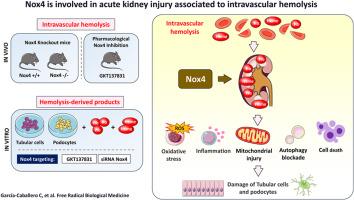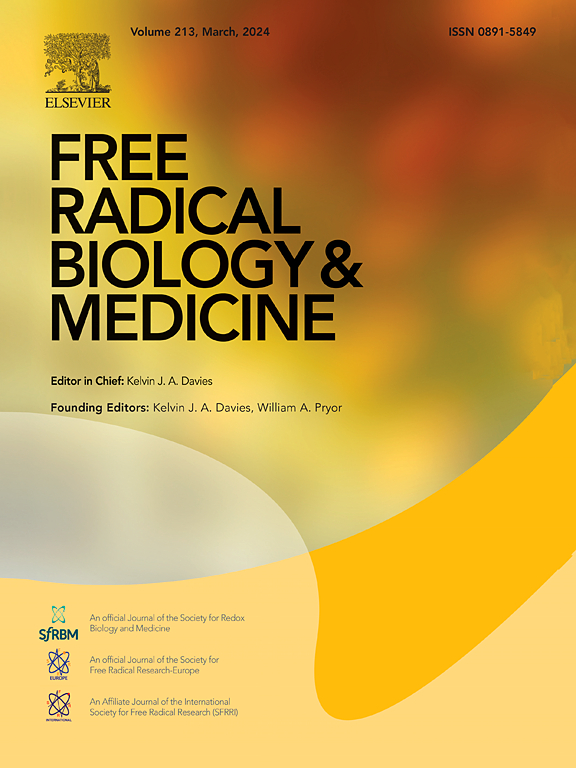Nox4 参与了与血管内溶血相关的急性肾损伤。
IF 7.1
2区 生物学
Q1 BIOCHEMISTRY & MOLECULAR BIOLOGY
引用次数: 0
摘要
在许多临床病症中,血管内大量溶血的情况并不少见。红细胞的破裂会促进血红素衍生物在肾脏中的积累,增加氧化应激和细胞死亡,从而促进急性肾损伤(AKI)。NADPH 氧化酶 4(Nox4)是肾脏中活性氧(ROS)的主要来源,但目前还不清楚 Nox4 在溶血中的作用,也不知道抑制这种酶是否能防止血红素介导的损伤。为了回答这些问题,我们在野生型小鼠和 Nox4 基因敲除小鼠体内诱发了血管内溶血。我们还评估了在体内和培养的肾细胞中使用 Nox4 siRNA 和 Nox4 抑制剂 GKT137831 的药理抑制作用是否可以降低血红素的肾毒性效应。我们的研究结果表明,诱导大量溶血会引起以肾功能丧失、肾小管上皮细胞和荚膜细胞形态改变、氧化应激、炎症、线粒体功能障碍、自噬受阻和细胞死亡为特征的 AKI。这些病理效应在 Nox4 缺失的小鼠和接受 GKT137831 治疗的动物身上得到了明显的预防。体外研究表明,通过特异性 siRNA 或 Nox4 抑制剂破坏 Nox4 可减少血红素介导的 ROS 生成和细胞死亡。我们的数据确定了 Nox4 是参与血管内溶血诱导的 AKI 的关键酶。因此,Nox4抑制剂可能是预防严重溶血危象患者肾损伤的一种潜在治疗方法。本文章由计算机程序翻译,如有差异,请以英文原文为准。

Nox4 is involved in acute kidney injury associated to intravascular hemolysis
Massive intravascular hemolysis occurs not unfrequently in many clinical conditions. Breakdown of erythrocytes promotes the accumulation of heme-derivates in the kidney, increasing oxidative stress and cell death, thus promoting acute kidney injury (AKI). NADPH oxidase 4 (Nox4) is a major source of reactive oxygen species (ROS) in the kidney, however it is unknown the role of Nox4 in hemolysis and whether inhibition of this enzyme may protect from heme-mediated injury. To answer these questions, we elicited intravascular hemolysis in wild type and Nox4 knockout mice. We also evaluated whether nephrotoxic effects of heme may be reduced by using Nox4 siRNA and pharmacologic inhibition with GKT137831, a Nox4 inhibitor, both in vivo and in cultured renal cells. Our results showed that induction of massive hemolysis elicited AKI characterized by loss of renal function, morphological alterations of the tubular epithelium and podocytes, oxidative stress, inflammation, mitochondrial dysfunction, blockade of autophagy and cell death. These pathological effects were significantly prevented in Nox4-deficient mice and in animals treated with GKT137831. In vitro studies showed that Nox4 disruption by specific siRNAs or Nox4 inhibitors declined heme-mediated ROS production and cell death. Our data identify Nox4 as a key enzyme involved in intravascular hemolysis-induced AKI. Thus, Nox4 inhibition may be a potential therapeutic approach to prevent renal damage in patients with severe hemolytic crisis.
求助全文
通过发布文献求助,成功后即可免费获取论文全文。
去求助
来源期刊

Free Radical Biology and Medicine
医学-内分泌学与代谢
CiteScore
14.00
自引率
4.10%
发文量
850
审稿时长
22 days
期刊介绍:
Free Radical Biology and Medicine is a leading journal in the field of redox biology, which is the study of the role of reactive oxygen species (ROS) and other oxidizing agents in biological systems. The journal serves as a premier forum for publishing innovative and groundbreaking research that explores the redox biology of health and disease, covering a wide range of topics and disciplines. Free Radical Biology and Medicine also commissions Special Issues that highlight recent advances in both basic and clinical research, with a particular emphasis on the mechanisms underlying altered metabolism and redox signaling. These Special Issues aim to provide a focused platform for the latest research in the field, fostering collaboration and knowledge exchange among researchers and clinicians.
 求助内容:
求助内容: 应助结果提醒方式:
应助结果提醒方式:


